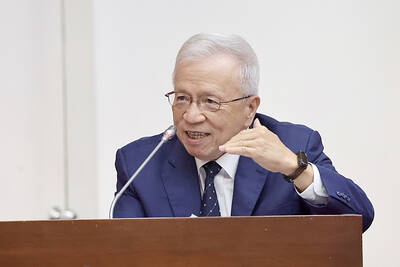President Chen Shui-bian (
Invitations for a tea party at 3pm at the Presidential Office were sent to banks including Morgan Stanley & Co, Goldman Sachs Group, UBS AG, JP Morgan Chase & Co, Merrill Lynch & Co, Deutsche Bank AG, the officials said, without elaborating.
At the closed-door meeting, Chen will be accompanied by the nation's top economic and financial officials to exchange views with his guests on the development of the nation's capital markets and investment environment.
Chen may also take the opportunity to reach out personally to persuade overseas investors to invest in Taiwan, according to local Chinese-language news media.
Foreign investors have been net sellers for 19 straight sessions since April 27 on concerns of a rise in US interest rates and rising oil prices, unloading a net US$3.8 billion in Taiwanese stocks, according to the Taiwan Stock Exchange.
The benchmark TAIEX dropped to a nine-month low of 5,482.96 on May 17 amid heavy selling by foreign investors following a statement from China that Chen must accept Chinese sovereignty or ``face destruction by playing with fire.''
In a bid to help reverse their selling, the Ministry of Finance announced on May 18 it was relaxing restrictions on foreign investments in the nation's stock market.
The changes will allow foreign-investor trading in the futures markets and give them permission to buy "call" options and sell "put" options. In addition, they would no longer need approval from the central bank's foreign exchange department for investment in the domestic stock market, the ministry said.
Premier Yu Shyi-kun ordered the measures to take effect within two months.
Apart from cross-strait tensions, topics for today's meeting may also include the possible impact of China's measures to cool its overheating economy and expected changes to Taiwan's status in Morgan Stanley Capital International Inc's indices, the Central News Agency (CNA) said.
Central Bank of China Governor Perng Fan-nan (
Bankers invited to the Presidential Office include Susan Lin (

JITTERS: Nexperia has a 20 percent market share for chips powering simpler features such as window controls, and changing supply chains could take years European carmakers are looking into ways to scratch components made with parts from China, spooked by deepening geopolitical spats playing out through chipmaker Nexperia BV and Beijing’s export controls on rare earths. To protect operations from trade ructions, several automakers are pushing major suppliers to find permanent alternatives to Chinese semiconductors, people familiar with the matter said. The industry is considering broader changes to its supply chain to adapt to shifting geopolitics, Europe’s main suppliers lobby CLEPA head Matthias Zink said. “We had some indications already — questions like: ‘How can you supply me without this dependency on China?’” Zink, who also

At least US$50 million for the freedom of an Emirati sheikh: That is the king’s ransom paid two weeks ago to militants linked to al-Qaeda who are pushing to topple the Malian government and impose Islamic law. Alongside a crippling fuel blockade, the Group for the Support of Islam and Muslims (JNIM) has made kidnapping wealthy foreigners for a ransom a pillar of its strategy of “economic jihad.” Its goal: Oust the junta, which has struggled to contain Mali’s decade-long insurgency since taking power following back-to-back coups in 2020 and 2021, by scaring away investors and paralyzing the west African country’s economy.

Taiwan Semiconductor Manufacturing Co (TSMC, 台積電) received about NT$147 billion (US$4.71 billion) in subsidies from the US, Japanese, German and Chinese governments over the past two years for its global expansion. Financial data compiled by the world’s largest contract chipmaker showed the company secured NT$4.77 billion in subsidies from the governments in the third quarter, bringing the total for the first three quarters of the year to about NT$71.9 billion. Along with the NT$75.16 billion in financial aid TSMC received last year, the chipmaker obtained NT$147 billion in subsidies in almost two years, the data showed. The subsidies received by its subsidiaries —

BUST FEARS: While a KMT legislator asked if an AI bubble could affect Taiwan, the DGBAS minister said the sector appears on track to continue growing The local property market has cooled down moderately following a series of credit control measures designed to contain speculation, the central bank said yesterday, while remaining tight-lipped about potential rule relaxations. Lawmakers in a meeting of the legislature’s Finance Committee voiced concerns to central bank officials that the credit control measures have adversely affected the government’s tax income and small and medium-sized property developers, with limited positive effects. Housing prices have been climbing since 2016, even when the central bank imposed its first set of control measures in 2020, Chinese Nationalist Party (KMT) Legislator Lo Ting-wei (羅廷瑋) said. “Since the second half of